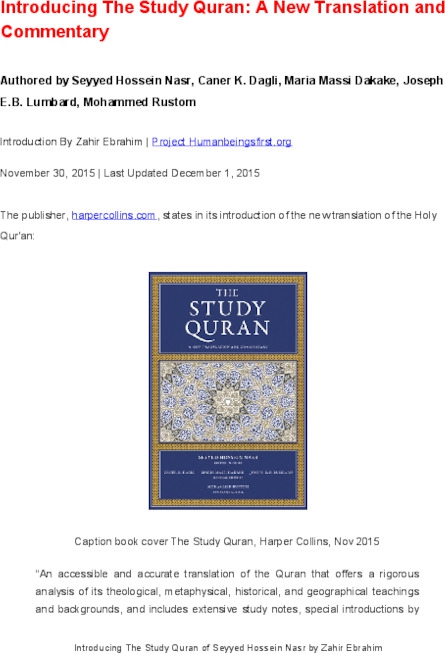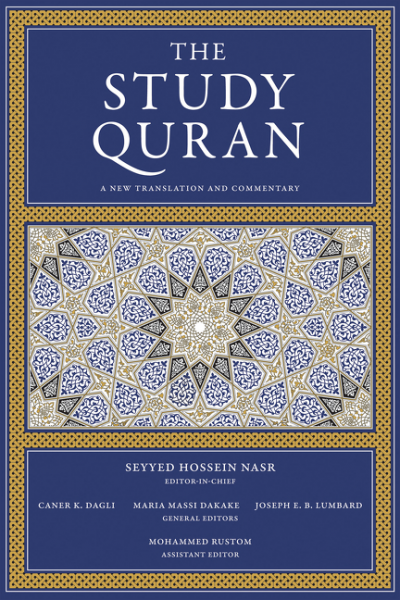Introducing The Study Quran of Seyyed Hossein Nasr by Zahir Ebrahim
Introducing The Study Quran: A New Translation and Commentary
Authored by Seyyed Hossein Nasr, Caner K. Dagli, Maria Massi Dakake, Joseph E.B. Lumbard, Mohammed Rustom
Introduction By Zahir Ebrahim | Project Humanbeingsfirst.org
November 30, 2015 | Last Updated December 1, 2015
The publisher, harpercollins.com, states in its introduction of the new translation of the Holy Qur'an:
Caption book cover The Study Quran, Harper Collins, Nov 2015
“An accessible and accurate translation of the Quran that offers a rigorous analysis of its theological, metaphysical, historical, and geographical teachings and backgrounds, and includes extensive study notes, special introductions by experts in the field, and is edited by a top modern Islamic scholar, respected in both the West and the Islamic world.
Drawn from a wide range of traditional Islamic commentaries, including Sunni and Shia sources, and from legal, theological, and mystical texts, The Study Quran conveys the enduring spiritual power of the Quran and offers a thorough scholarly understanding of this holy text.
Beautifully packaged with a rich, attractive two-color layout, this magnificent volume includes essays by 15 contributors, maps, useful notes and annotations in an easy-to-read two-column format, a timeline of historical events, and helpful indices. With The Study Quran, both scholars and lay readers can explore the deeper spiritual meaning of the Quran, examine the grammar of difficult sections, and explore legal and ritual teachings, ethics, theology, sacred history, and the importance of various passages in Muslim life.
With an introduction by its general editor, Seyyed Hossein Nasr, here is a nearly 2,000-page, continuous discussion of the entire Quran that provides a comprehensive picture of how this sacred work has been read by Muslims for over 1,400 years.”
Just reading that lovely advert and the name of its distinguished first author got me to order this new English translation of the Holy Qur'an. I invite you to do so as well. The link for Amazon is below.
The quality of Holy Qur'an translations is a perennial issue. Like this scholar had so simply stated in his talk at Harvard University in 2010: the Holy Qur'an is fundamentally untranslatable – into any language (http://thecrimson.com/article/2010/10/29/wild-quran-translate-arabic/ ).
Nevertheless, translating the Holy Qur'an is often a labor of love, bordering on obsession in selfless service for those who undertake it. And sometimes, despite all their best intentions, they do miss by a mile. A few years ago, Dr. Seyyed Hossein Nasr's self-proclaimed protégé, the Iranian-American psychologist and translator of many books into English, Dr. Laleh Bakhtiar, prepared a translation titled 'The Sublime Quran' which was prominently billed by its publisher as the first English translation by an American woman. It was greeted with glee in The Times UK of March 31, 2007 with the eye-catching headline: “Wife-beating rejected in ‘new’ Koran”. This much heralded work in the Western press unfortunately suffered from many obvious weaknesses which were cleverly camouflaged in irrelevant fancy academic jargon by the translator. Quickly returning that lame translation to the bookstore, I wrote a critique of that beautifully bound work and sent it to its author with this précis:
'In other words, in order to “religiously” maintain your academic notion of “internal consistency” and “formal equivalence”, you deliberately sacrificed Semantic Equivalence!!' --- Zahir's letter to Laleh Bakhtiar, 2011
I hope that her notable teacher's new translation on the block now being billed as the best English translation for the modern Western English speaking audience, which CNN of course readily headlined on November 25, 2015 as “Could this Quran curb extremism?”, has not only rectified the egregious error of failing to meet “semantic equivalence” even by a long shot as it was never the principal goal in 'The Sublime Quran' translation – the gold standard for any good translation into any target language – but suffers from no weaknesses that can at all be overcome in any translation of the Holy Qur'an into English by any human endeavor.
My two straws' worth of analysis of Laleh Bakhtiar's translation which explains “semantic equivalence” – a layman's critique at best, and if the translation could not pass the superficial scrutiny of even this layman, the silence of latter day scholars of Islam, like Dr. Nasr himself, on that translation so egregiously attempting to “bring reform to Islam” as repeatedly proclaimed by the translator to the Western news media, is not at all comprehensible – is here:
Strangely, Dr. Nasr never responded to my letter on his protégé's handiwork which I had hastily pegged as a politically motivated agendist translation, and for which, unfortunately, I never found any compelling evidence to revise that conclusion:
The proof of the pudding for this new entrée by Nasr et. al. will be in its eating of course. Not in its beautiful binding and book cover, or its imposing number of pages (the advert says 2048 pages in the hardcover), and nor in how many brilliant man-hours were spent in preparing it for what lofty purposes.
The accuracy and fidelity of any translation is gauged by semantic equivalence of the Qur'anic Arabic text translated and reframed into English such that the diligent English speaking audience get the same (or close to the same) understanding of the Qur'an from the translated English text as the diligent native Arabic speaking audience get from the Arabic text. That is the gold standard for any translation in general, and more so for a religious text being brought to a non-native speaking Western audience in an atmosphere such as the one we have today – of rising Islamofascism, and the political mileage being derived by bashing the religion of Islam on the one hand by setting up the strawman of “militant Islam”, and its apologists sanitizing away the accurate meaning of the import of the religion of Islam to denying “taghoot” (villainy) its privileges of primacy on the other hand, as the “moderate Islam”. In that synthetic discourse space artificially carved out by the “militant Islam” vs. “moderate Islam” dichotomy and so propagandistically introduced into the American and Western narrative since 9/11, the study of Islam and the Holy Qur'an has made a resurgence in the West, especially among its youth.
The interest in Islam is so overwhelming in the West that even the incumbent Iranian leader of Islamic Revolution, valih-e-faqih Ayatollah Seyyed Ali Khamenei, seized upon this opportunity in his two open letters to the youth of America and Europe (see 21st Jan. 2015 and 29th of Nov, 2015), inviting them to study Islam on their own by going directly to the Holy Qur'an translation in the language they best understand, instead of learning about Islam and Muslims from their propagandistic news media. These two remarkably honest open letters the likes of which have not been witnessed from the pen of any modern statesman of recent history, straightforwardly state the global reality the way it actually is, in a style and candor that is reminiscent of prophetic wisdom sorely missing from global statesmanship today.
Well, all recognize that this oppressive atmosphere against Islam and Muslims in the West is also an opportunity to teach the religion of Islam as it is explained in its own singular scripture, the Holy Qur'an, to let the Holy Qur'an speak for itself. One hopes therefore, that this yet another new English translation of the Holy Qur'an by Nasr et. al. speaks to that opportunity, bringing both accuracy and fidelity to break the choke hold of this synthetic and wholly propagandistic narrative upon the Western mind. Revealingly to some, and one would be remiss for not commenting on it, many of the exponents heralding this new Nasr translation are themselves participants in that synthetic discourse of “Militant Islam” vs “moderate Islam” and “good Muslim” vs “bad Muslim”. It would surely be interesting to see how Nasr et. al. respond to the support of their biggest champions for their new translation who have also encouraged the bombing of Muslim nations “United we Stand” with the standard propaganda narratives of empire. The support and funding of this translation are from imperial players, the least of whom is King Abdullah II of Jordan according to CNN report.
Beyond that metric of fidelity of translation however, understanding the deeper meanings of the Qur'anic text and of the religion of Islam often requires recourse to exegesis for context and explanation, and far deeper personal study and reflection for comprehension of a text that was revealed 1400 years ago in the language, and the time and space, of a backward Beduin people of a tribal society that no longer exists in the modern world. None of the Qur'anic allusions and metaphors, similes, rich and dense vocabulary in which the same word or phrase can express a multiplicity of meanings based on its context and style of usage, make sense in its original literal translated form in today's epoch. How are these to be reframed or translated for today's audience? These have to be interpreted --- and that means the authors' subconscious biases and prejudices, his and her knowledge and expertise in the Qur'anic base which include many disciplines, and his and her propensity and psychological and religious persuasion, come into play, even unwittingly.
These are burdens which every student of the Holy Qur'an has to face, not just the translators, whether working with its original Arabic, or in translation, and no single translation or compilation or exegesis, even when written by a bipartisan committee as Nasr's work proclaims to be, can be a substitute or compensate for the requirement of that due diligence and struggle for comprehension with a cleansed heart (without prejudice or presuppositions) as advocated in the Holy Qur'an itself. Sort of obvious to many Muslims, but better to state this for completeness because modern marketing can sell anything today, and can make the public mind on any matter any which way.
When a translation, or an approach, paves the way towards that aforementioned due diligence with fidelity and honesty of purpose, it is to be recommended. The limitations put on the study and translations just have to be understood so as neither to fool oneself nor deceive others. Just the good name of Dr. Seyyed Hossein Nasr invites that first look without even reading the book. His lofty goal and aspiration makes it even more inviting: “We hope this will be a small contribution to unity in the Islamic world.” (Ibid.) The eating of the pudding of course will soon dispel any hasty illusions on its exaggerated baking. Make up your own mind by competently acquiring at least some understanding first on the monumental task which any translation of the Holy Qur'an presents, and what these good authors, notable Muslims, must have gone through even if they had the requisite skills for the monumental undertaking.
Here is a link to its purchase at Amazon for the sale price of $39.99 - $60 off the list price I am told.
The difficulties in parsing and understanding the Holy Qur'an, in any language, including its own native Arabic, is outlined in the case study on Hijacking the Holy Qur'an which forms chapter one of my book: Hijacking the Holy Qur'an and its religion Islam. This humble endeavor by an ordinary seeker of truth sketches out, with examples, why the Holy Qur'an is hard to parse, both syntactically as well as semantically, let alone comprehend in its full and exacting richness, even for native Arabic speakers, and why it is essential, nay necessary, not to interpret it by whim and fancy of one's own imagination, but to extract the exact meaning intended to be conveyed by its Author to mankind:
Zahir Ebrahim
Project Humanbeingsfirst.org
Source URL: http://faith-humanbeingsfirst.blogspot.com/2015/11/introducing-study-quran-of-nasr.html
Print URL: http://print-humanbeingsfirst.blogspot.com/2015/11/introducing-study-quran-of-nasr.html
First published November 30, 2015 | Last updated Tuesday, December 1, 201501:08 pm2045
Introducing The Study Quran of Seyyed Hossein Nasr by Zahir Ebrahim
Get Involved
If you'd like to help with maintaining or developing the website, contact us.
Publish
Publish your stories and upcoming events on Indybay.





